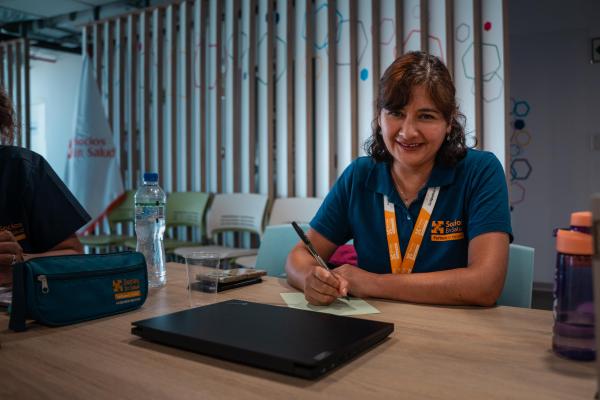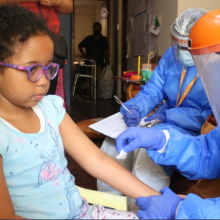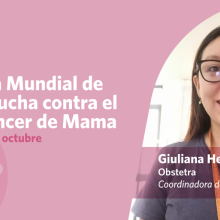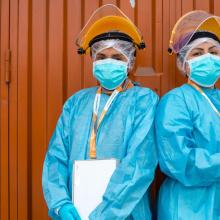In most health centers, the first person to see someone is not a doctor. It is a nurse or an obstetrician. They accompany children’s growth, detect preventable diseases and are pillars in key programs such as mental health, HIV, tuberculosis or sexual and reproductive health.
Although their role is essential, it is rarely recognized that, in addition to providing care, these professionals lead teams, promote change and face critical situations with leadership, empathy and decision-making capacity. Their impact goes beyond the clinical: they are role models for their colleagues and communities.
That is why, as part of Nursing Week, Socios En Salud (SES) highlights the work of nurses and obstetricians as leaders in community health, and underscores the need to strengthen their leadership, mentoring and decision-making skills to face the challenges of the health system.
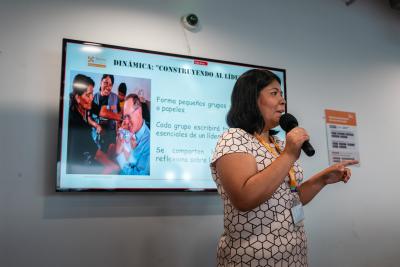
Rosa Yataco, jefa de monitoreo y evaluación en la DGP de Socios En Salud, lideró el programa de capacitación en habilidades de liderazgo para enfermeras y obstetras.
Foto de Julio López / SES
Training health leaders from the first level of care
“Leadership is something we exercise every day, but we are not always aware of it,” says Rosa Yataco, head of monitoring and evaluation at SES’s Program Management Directorate.
This is why Socios En Salud implemented a Leadership Skills Training Program for Nurses and Midwives, lasting six months in which 70% of these healthcare professionals participated.
Leadership in community health makes it possible to respond to vulnerable populations in contexts with limited access. In Peru, nurses and obstetricians lead from the clinical and social points of view. Therefore, programs such as this one seek to promote transformational leadership with technical and community impact from the first level.
“Many of our colleagues are afraid to participate in new opportunities. Sometimes because they don’t know how to get started. That’s why we decided to create a program that would help them recognize their leadership and prepare them to make decisions in their work environment,” Yataco tells.
She was in charge of the program, which included a total of six modules focused on topics such as fundamentals of community health leadership, self-leadership and personal management, communication and teamwork, decision making and problem solving, ethics and empowerment in leadership, and applied leadership in the community.
For Yataco, ongoing training is key. “A leader is not trained from one day to the next, she is gaining experience and must share it with others, as a mentor, as a peer,” she says.
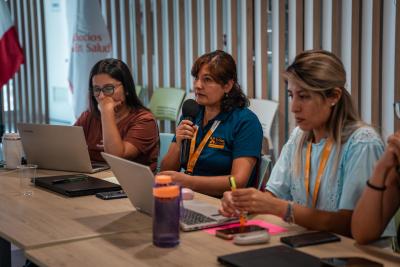
Las obstetras Danna Obregón, Jenny Orihuela y Carla Rodríguez, de los programas SAMIA, Unidad de Ensayos Clínicos y VIH, respectivamente, reforzaron sus habilidades de liderazgo, consolidando su rol clave en la atención y transformación de la salud comunitaria.
Foto de Julio López / SES
Leadership in action: experiences from the field
Danna Obregón, obstetrician and coordinator of the Salud Materno Infantil y Adolescentes (SAMIA), acknowledges that the leadership course allowed her to identify something she had already been doing: leading a team of community agents. “I was the one who had the professional training, but they were the ones accompanying people in their day-to-day lives. So my role was also to provide them with tools and recognize them as agents of change.”
Obregón stresses that nurses and obstetricians are already natural leaders at the first level of care: “We are the ones who work directly with the community, who promote health and prevent disease. But that requires preparation and leadership to deal with the unexpected that always pops up in the community.”
Jenny Orihuela, an obstetrician and clinical trials monitor at the Clinical Trials Unit (UNEC), adds that leadership is also exercised in technical settings. “It has allowed me to improve my active listening, teamwork and confidence building. And that is fundamental, because in community health, if people don’t trust you, you can’t help them.”
For Orihuela, leadership should not only be applied to work, but also to social transformation: “If I could implement a change, it would be from education. If the population is better educated in health, they can take better care of themselves and go to health centers in a timely manner.”
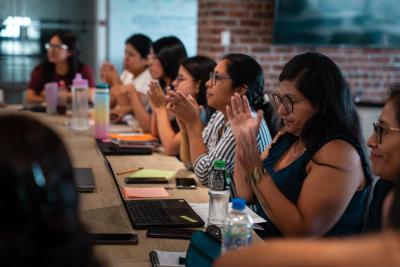
Durante seis meses, el 70 % de las enfermeras y obstetras de Socios En Salud participó en este programa de capacitación para fortalecer sus habilidades de liderazgo y responder con mayor preparación a los desafíos de la salud comunitaria.
Foto de Julio López / SES
Breaking stereotypes: obstetricians in invisible communities
Carla Rodríguez, obstetrician and coordinator of the HIV and STI program, relates that thanks to her role she has been able to break stereotypes about her profession. “We tend to associate obstetricians with childbirth care or the health of women of childbearing age. But today I work with trans women, a population that has historically been excluded from the system.”
Through her work, Rodriguez not only provides care, but builds bridges of trust. “Leading in this context is also raising awareness from the way you speak, how you look or how you address people. It is a constant challenge, because many of them have suffered family and social rejection.”
Her greatest wish: equal opportunities. “Not just in access to health, but in rights. That’s what can really change the lives of these communities.”
On the other hand, in rural areas, where doctors are often unavailable, nurses alone lead care at health centers. Edith Soncco, a nurse at UNEC, recalls the importance of teamwork and clear communication to effect change. “The nurse not only attends: she organizes, directs and faces whatever comes up. That’s why it’s essential to empower herself and strengthen her skills.”
The impact of her role goes beyond the clinical. By managing programs such as tuberculosis, nutrition or mental health, they are often the only health referrals in isolated communities.
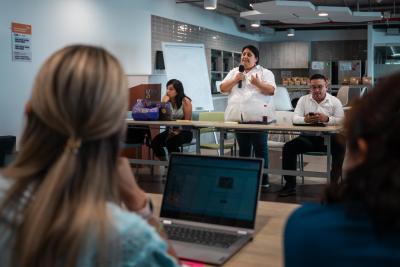
Tomar la voz es importante: el programa buscó que enfermeras y obstetras de Socios En Salud reconozcan y fortalezcan su liderazgo para transformar la atención desde la comunidad.
Foto de Julio López / SES
A future with more opportunities
They all agree on one thing: leadership is learned, trained and strengthened through experience and constant training.
From Partners In Health, this week serves as an opportunity to make visible what is often invisible: the determining leadership of nurses and obstetricians in the healthcare system.
For Rosa Yataco, this is just the first step: “We need more professionals to dare, train and recognize themselves as leaders. Because in the community, their role is not only clinical. It is transformative.”
Be part of the change. Get our actions, stories and opportunities to transform lives in your inbox. Subscribe here and join our movement for health!
